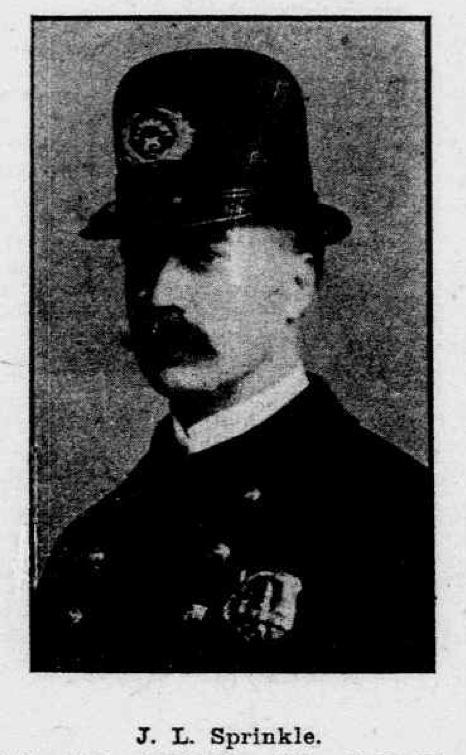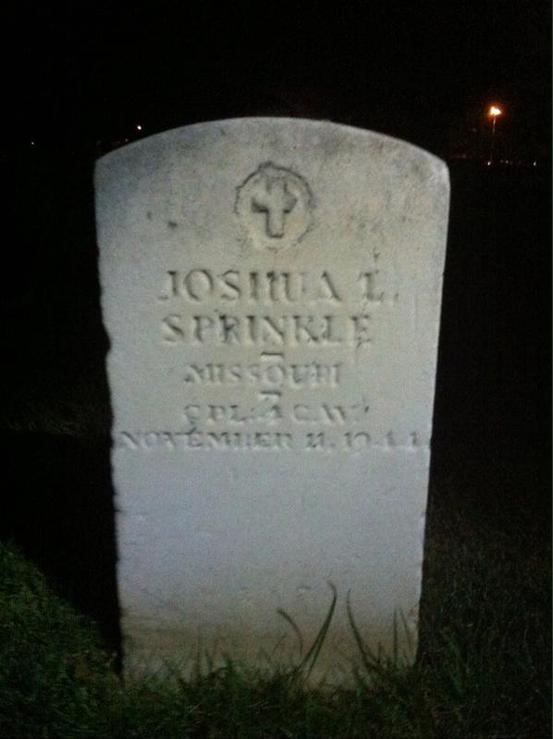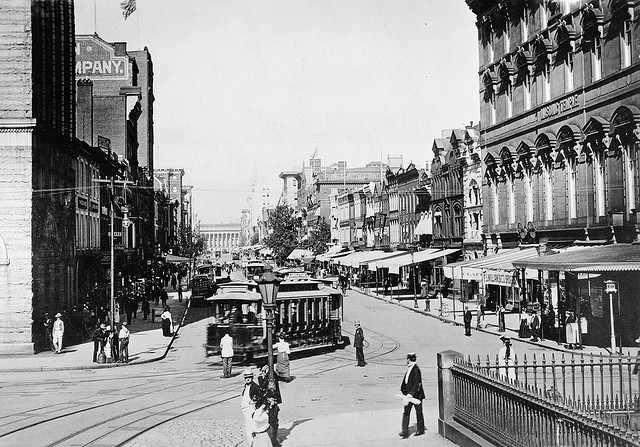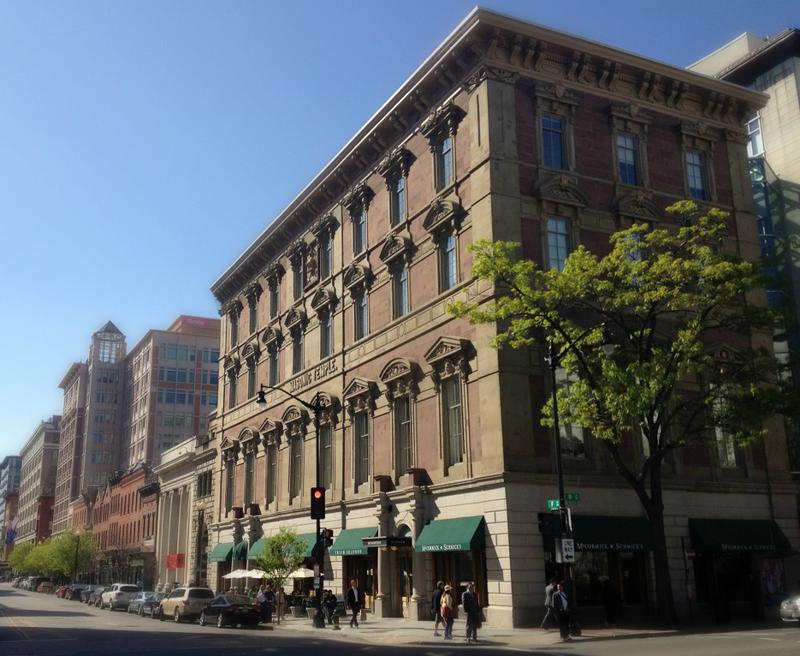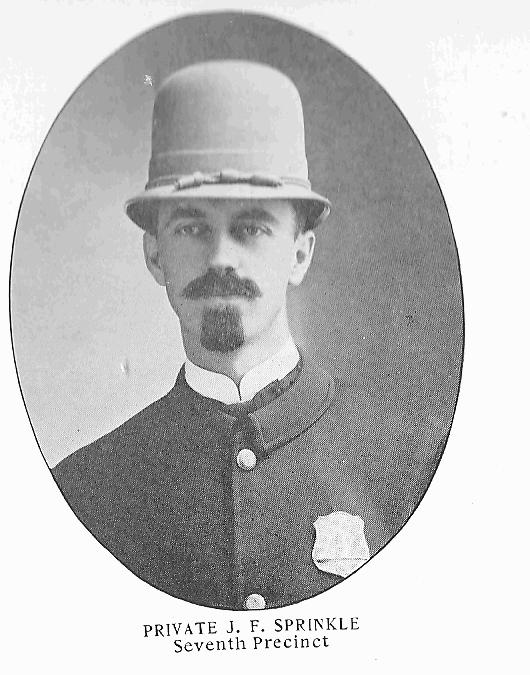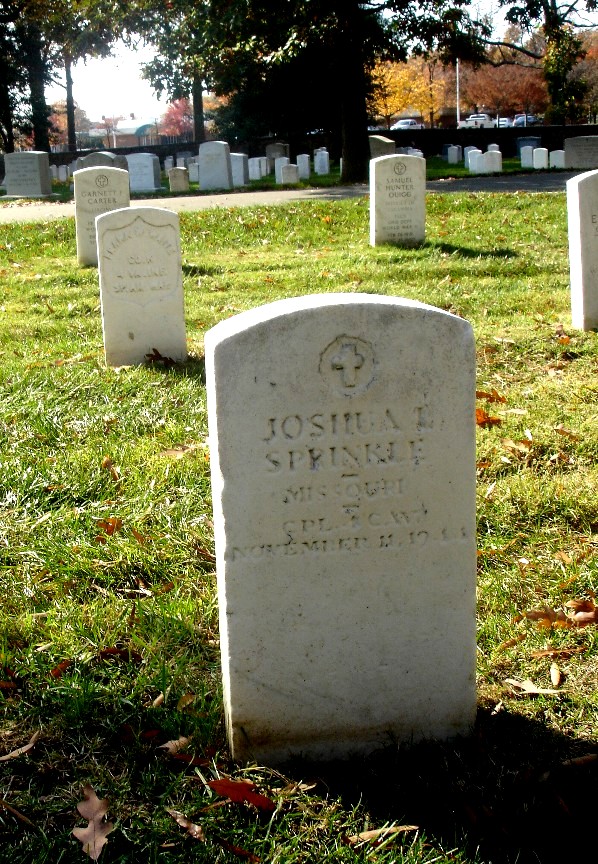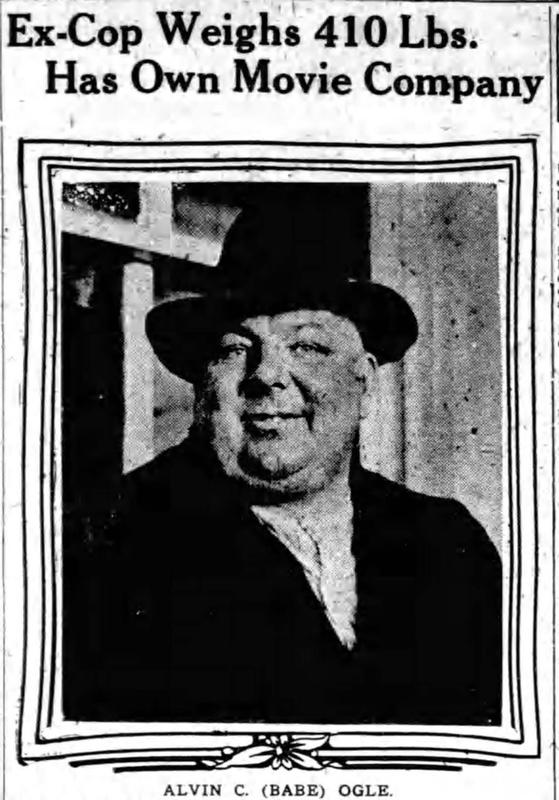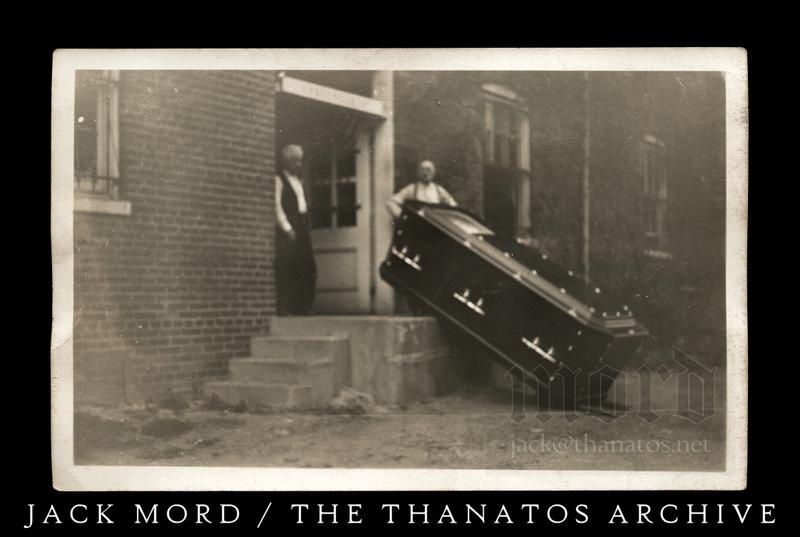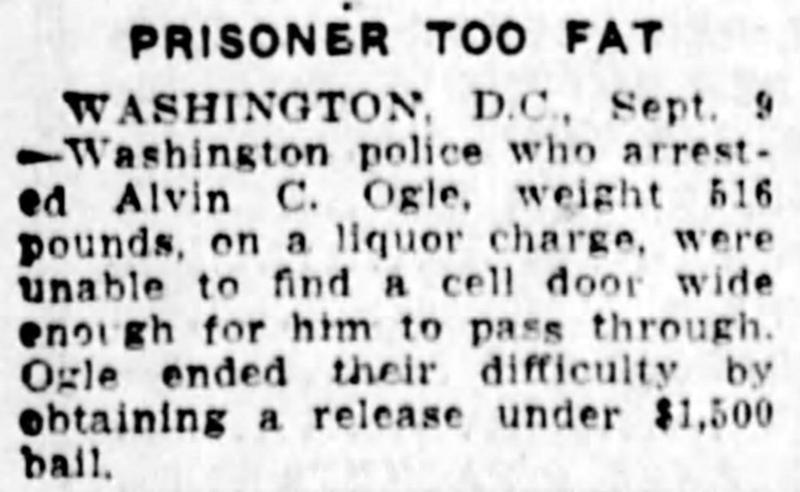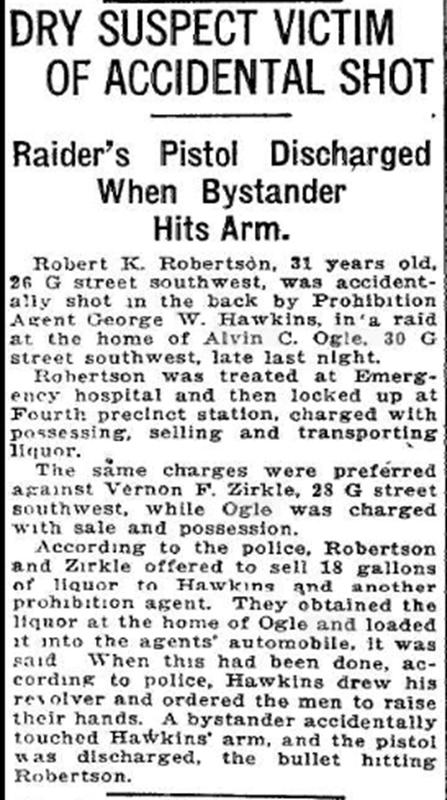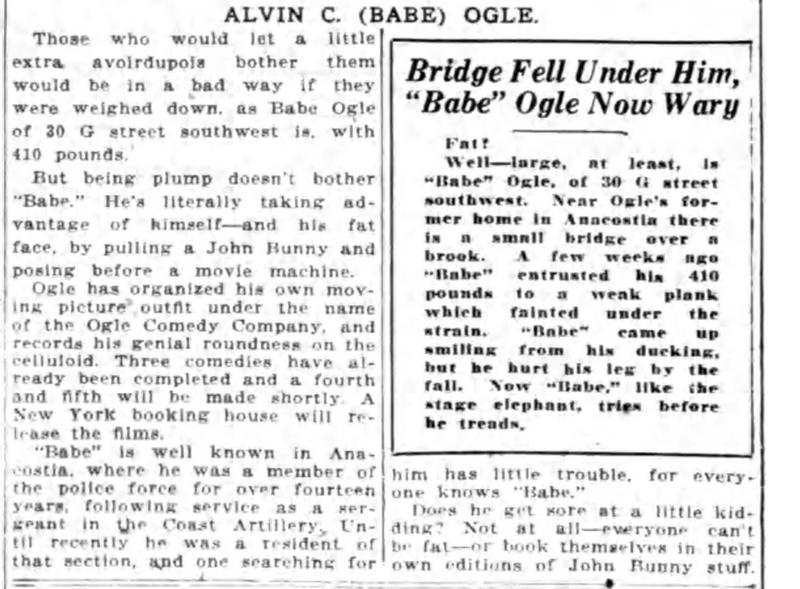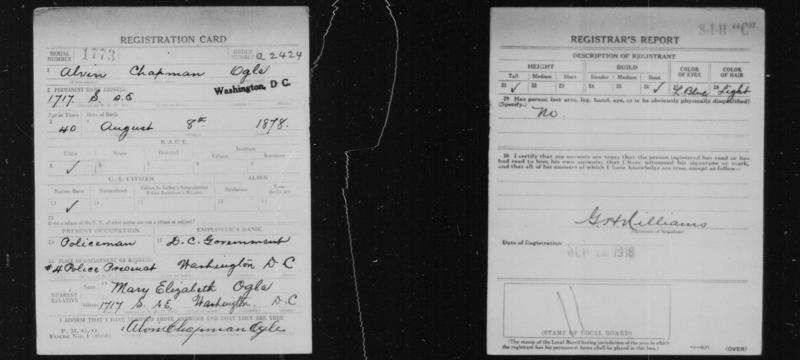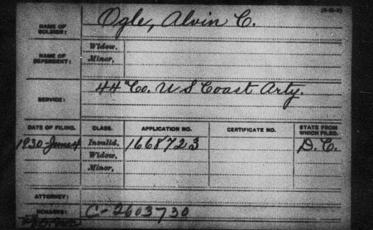Washington D.C. Metropolitan Police's
LIEUTENANT J. L. SPRINKLE
Lieutenant J. L. Sprinkle, stationed at No. 2 precinct, was born July 7th, 1864, on a farm south of Columbus, Ohio, where he lived with his parents until he was eleven years old, at which time the family moved to Des Moines, Iowa. At the age of twelve years he took up an apprenticeship in the harnessmakers and carriage trimmers’ trade. He followed this apprenticeship, attending school at the same time, until he was sixteen years old, that year finishing his education in the high school, and became a full journeyman. He then took up the study of civil engineering. In that capacity he assisted in making the first survey of what is now the Great Western Railroad, from Chicago to Kansas City. Later he followed his trade, except for a brief period, when he was a member of the Kansas City Fire Department. At the age of twenty-one years he enlisted in the United States Army for five years, and was assigned to Troop B, Fourth Cavalry, then stationed at Fort Huachua, Arizona, near the Mexican border. At that period, 1885, there was much unrest and strife among the lawless element in Old Mexico, New Mexico and Arizona. By reason of the geographical location of Fort Huachua the troops garrisoning at that post were kept on the jump every day in the year chasing border smugglers and thieves, principally cattle thieves, and in fighting hostile Indians.
Lieutenant Sprinkle went all through the campaign with his troop, commanded by Captain H. W. Lawton–later Captain Lawton was killed in the Philippines–against that notorious assassin, Geronimo, the Indian chief, and his gang of murderers, that resulted in the practical annihilation of the band and the capture of Geronimo. In this campaign Lieutenant Sprinkle’s command was continuously on the go for weeks at a time without taking off their clothes for the brief rest periods that came to them. Geronimo was captured at Skeleton Canyon, Mexico, and by the captors taken to the old Spanish fort at St. Augustine, Fla., and here made a prisoner. Later Geronimo was sent to Oklahoma, and is still a prisoner there. Dr. Leonard Wood, now a major general, who so highly distinguished himself in the late war with Spain in the Philippines, was at the capture of the notorious old Indian chief. This campaign lasted eight months, during which time the troops operating against Geronimo were practically without shelter, and many times without food. Lieutenant Sprinkle’s command started into the campaign with sixty-four picked and tried men, and finished with twenty-two, forty-two of the command having been killed in action. Lieutenant Sprinkle was one of ten men of his command in this campaign that volunteered to accompany Dr. Wood–now General Wood–on a scouting expedition against the Indians, lasting ten days. When volunteers were called for this trip the men were told it would be a most hazardous one, and that in all probability none of the body of volunteers would ever return from the trip. For three days they were without water. The mission was accomplished, and every volunteer returned in safety to his command/
On one occasion Lieutenant Sprinkle volunteered to make a trip of 350 miles over trackless mountains, infested by hostile Indians, to reach the base of supplies. He successfully accomplished the trip, and in doing so secured aid in the way of provisions which saved the men in the field from starvation. For his bravery and the successful accomplishment of his mission, covering a period of four days and four nights, he was publicly commended for his bravery in general orders read at all army posts.
After the Geronimo campaign he served in the West with his old command, and later was with the First Cavalry, stationed at Fort Myer. He was honorably discharged from the army on August 5, 1890. He was appointed a member of the Metropolitan Police force September 1, 1890. He was promoted to sergeant August 17, 1898, and a lieutenant July 1, 1906. For bravery, intelligent and efficient service he is one of the best men on the force, and has no superior in any line of police work that comes to a police precinct.
A “Bomb” is Found and Officer Sprinkle Saves the Day
This tale from the annals of Officer Sprinkle dates back to July 1st, 1914. The Washington Post reported a story about an explosive device found in a telephone box near the Old Masonic Temple.
“Does look like an infernal machine,” declared another.
Then the police were notified that an attempt to blow up the Old Masonic Temple, at Ninth and F streets northwest, last night, had been frustrated by the timely discovery of an explosive device hidden in a telephone booth adjoining the large auditorium on the second floor.
There was to be a mass meeting of citizens held in the hall, the purpose of which was to protest against the colored man enjoying franchise.
When the police arrived they found an excited group near the telephone booth, wherein reposed to the deadly machine. A detective approachel [sic] the booth stealthily, and gingerly lifted the suspected object out. The crowd backed away.
There were many conjectures as to the object of the person who planted the bomb.
There appeared to be several fuses issuing from it. The thing was about the size of a shoe box, made of wood, painted black, and embellished with strange copper appliances. The police exercised the greatest of care in handling it at the First precinct station, where “it” was taken. Lieut. J. L. Sprinkle examined the thing, but did not accept a challenge to take a kick at it. During the deliberations Frank S. Hammersley, 940 Thirteenth street southeast, an electrician, came rushing into the station, and said he had been robbed.
“Yes, robbed,” he continued. “I’ve been working on a new model for an electric battery. This afternoon I left my battery in a telephone booth up at the Old Masonic Temple, and now it’s gone.”
Lieut. Sprinkle pointed to the “infernal machine.” “Is that it?” he asked.
Hammersley’s face beamed with joy. He pounced upon his invention and hugged it in his arms.
“That’s it,” he said. “Some durn fool stole it, but I knew the police would find it for me all right.”
There are so many things ridiculous about this, the first obviously being the anachronistic racism, warranting a mass meeting of citizens. The second being the absurd lack of training in handling explosives and sheer reliance on gut instinct and bravery (or stupidity) — did someone really yell out to kick the damn thing? That’s not dumb at all, worthy of a Darwin award … luckily, our Officer Sprinkle is not a Darwin award candidate.
GoDCer Jacqueline Drayer (aka, @jackie_bird) took some great photos of the Old Masonic Temple. The featured photo is also by her, so this post would be bland without her contributions, not to mention her proofreading … she caught an extraneous comma when previewing the post.
Old Masonic Temple building (via Jacqueline Drayer)
Stories by "Ghosts of D.C." at https://ghostsofdc.org
Officer Sprinkle: Captured Geronimo, Accused Bootlegger, and Bodyguard to President Wilson
A couple of reader comments about an Officer Sprinkle in this earlier post piqued my interest in finding out a little more about the guy who has the kind of name you’d give to a cat. An unforgettable name, so hopefully I’ll be able to dig up enough information on this guy to write a post worthy of being “A Personal Story.”
Joshua L. Sprinkle was born July 7th, 1864 in Ohio, just south of Columbus (the 1900 Census incorrectly listed his place of birth as Iowa). In 1877, he moved to Des Moines, Iowa with his family.
When he was 12 years old, he became an apprentice in a harness and carriage trimming shop while also attending a local school. He pursued further studies in civil engineering and found himself in a surveying position on what became the Great Western Railroad, running from Chicago to Kansas City. While his surveying position landed him in Kansas City, he decided to enlist as a member of the city fire department.
In the 1880s, at the age of 21, he chose to enlist in the U.S. Army and served for a several years with Troop B of the Fourth United States cavalry, then stationed in Arizona. His time with the military included participating in the campaign against the Geronimo’s Apache nation and was present at the iconic Indian leader’s surrender in 1886 at Skeleton Canyon, Arizona. Not only was he present, but he was officially commended for his service. His troop escorted Geronimo and the remnant of his band to St. Augustine, Florida where he was made a prisoner.
After looking into this man’s past, I have come to one conclusion: Officer Sprinkle was a badass.
In 1890, at the age of 24, he was in Washington and had been accepted as an officer with the city police force. Throughout the 1890s he lived at 619 M St. NW with his wife Teresa, whom he married the year he started on the force.
Run Sprinkle, run
An amusing story about another hot pursuit by Officer Sprinkle was in the November 19th, 1894 Washington Post:
Daniel Reidy, an ex-policeman of the Ninth precinct, was arrested about 1 o’clock yesterday morning, by Officers Kilmartin and Flathers, for Detective Weedon, who wants him for the alleged fraudulent disposal of a horse and buggy. After Reid had been taken into the First precinct station and while he was being searched, he made a dash for liberty. He darted out of the station and up Twelfth street, with Officer Sprinkle, who has charge of the desk at the station, hot after him. Reidy ran to G street, then fell exhausted. Sprinkle was running so fast that he could not stop and fell over Reidy. The officer’s watch was broken by the fall and his clothing rent in several places by the force of the fall. Reidy was taken back and locked up.
Joshua and Teresa would go on to have two children, a daughter Alena and a son Clarence while living on M St. The incident I wrote about in the prior post happened in 1895, their last full year there. The following year, they moved to a new home at 1320 Florida Ave. NE and, around Thanksgiving of that year, had their third child, a son, Raymond. A fourth child, and the third son Joseph arrived in May of 1899.
Sprinkle household – 1900 U.S. Census
Another daughter, Helen, was born to the couple in 1904. And by the 1910s, they had moved their large family from their Florida Ave. residence to 924 Madison St. NW in Brightwood.
Two from the crazy vault
Here’s a story fit for its own “From the Crazy Vault” post. This is from an article in the June 19th, 1901 Washington Post, entitled “Chamber of Horror.”
A demented woman, forty-three years of age, absolutely nude and squatting on the filthy floor of a third-story room in a house where she has been shut up by her relatives for the past ten years, was the revolting discovery made at 1127 Fourth street northwest by health department and police authorities of the Capital yesterday afternoon.
…
Sergt. Sprinkle and a squad of men from the Second precinct accompanied Police Surgeon vail to the house, and soon after removed the insane woman from the scene of squalor and sent her to St. Elizabeth’s Asylum. The removal was witnessed by a horrified throng of persons, who were attracted by the investigations of the police.
I’m sure this is only one of many crazy scenarios into which Sprinkle was thrust. And here is yet another crazy incident he was a part of. This happened on March 6th, 1909.
Capt. William H. Matthews was shot and almost instantly killed in his private office in the Fifth precinct station house about 7:45 o’clock last night by Policeman J. W. Collier, of the same precinct. Collier is locked up charged with murder and refuses to tell why he fired the fatal shots.
Capt. William H. Matthews was shot and almost instantly killed in his private office in the Fifth precinct station house about 7:45 o’clock last night by Policeman J. W. Collier, of the same precinct. Collier is locked up charged with murder and refuses to tell why he fired the fatal shots.
Capt. Matthews was alone in his office when Collier entered. Attracted by five successive shots, Lieut. J. L. Sprinkle, who had just reached the building, rushed into the office and knocked a revolver from Collier’s hand as he was about to send another bullet into his victim’s head.
Two bullets had entered Matthews forehead between the eyes, and three had plowed their way through the temple bones and lodge in the brain. He lived about a minute.
This act is shocking, but what might be even more disturbing is how graphic this article is. Far more graphic than what we’re likely to see in paper’s today. It goes on to say:
Collier admitted shooting his superior officer, and explained that he had ample cause. To Lieut. Sprinkle he said:
“I shot him, and I don’t hesitate saying so. Too many people saw me with the revolver to deny anything. I don’t intend to make a statement until the proper time, and then I will tell everything.”
When Collier was hurried from the room the captain fell over on his back, and expired in Lieut. Sprinkle’s arms.
Bodyguard for the President
Popular Lieutenant Sprinkle of the 5th precinct (1914)
The March 1st, 1914 Washington Post has a full column praising Lieutenant J. L. Sprinkle’s service to the city as a popular and efficient officer. He was honored with the privilege of being a personal bodyguard to President Woodrow Wilson when he visited his home town of Staunton, Virginia. Below is an excerpt from the piece.
Lieut. J. L. Sprinkle, of the Fifth precinct, enjoys the double distinction of being one of the best officers on the force as well as one of its most popular members. He has had a long military training and one of his most cherished possessions is an honorable discharge from the service of the United States army. His military training has had much to do with his steady promotion in police work. He was selected as one of the personal bodyguard [sic] of President Wilson when the chief executive visited his home town of Staunton, Va.
Don’t disobey The Eighteenth Amendment
Lieutenant Sprinkle, charged with rum running in 1923
I came across an interesting piece in the December 1st, 1923 Washington Post, which implicated Sprinkle in a local Prohibition-related scandal.
Lieut. Joshua L. Sprinkle of the Eleventh police precinct, was arrested yesterday on charges of conspiring to defeat the purposes of the eighteenth amendment.
…
Lieut. Sprinkle is the tenth person to be rounded up by intelligence officers of the prohibition enforcement unit within 72 hours on charges of conspiracy.
Well that’s not a good thing to have on your record. He was being charged with participating in a rum running circuit, facilitating the flow of illicit alcohol into the city from the southern states. He was suspended from the service, pending the investigation.
On September 24th of the following year, the case was still pending (by then dubbed the Tampa liquor conspiracy) and Sprinkle was still suspended from the force. And from the sounds of this article, it seems like he might have been innocent, just in the wrong place at the wrong time (or I am gullible).
Three of the 15 local defendants in the so-called Tampa liquor conspiracy testified before United States Commissioner Needham C. Turnage yesterday in an effort to prevent their removal to Florida.
Lieut. Joshua L. Sprinkle, and William Haller, suspended member of the police department, and O.C. Fredericks, Pullman conductor, denied knowledge of the alleged conspiracy. Lieut. Sprinkle suggested the accusation against him was predicated upon his buying some corks for his wife at the store of James Hunter, one of the defendants, in D street northwest between Ninth and Tenth streets. He was in the store when a prohibition raiding party entered, he testified. Sprinkle said that he had not previously been in the store for six months.
Given his military track record and his exemplary service in the force, I have a hard time believing he would actually affiliate himself with a rum-running wracket, but I could be mistaken … though, innocent until proven guilty right?
Well, the case went all the was into March of 1925. It was dismissed, even though they were also indicted in Florida, the District Supreme court refused to permit extradition to Florida to stand trial. He was reinstated by Major Daniel Sullivan, with all back pay due to him.
Poor Joshua Sprinkle turned out to be caught up in the wrong place at the wrong time, dragging his pristine reputation through the mud in the waning years of this career. He ended up retiring from the police force that same year.
The old soldier
An article in the Post on September 8th, 1940 stated that Joshua Sprinkle was to receive a Masonic Token. At the time, he was residing at 924 Madison St. NW; he was also apparently the last known living soldier to have participated in the capture of Geronimo.
Final resting place
Joshua L. Sprinkle passed away on November 11th, 1944 (his wife Teresa died the previous year). He is buried in Arlington National Cemetery (Section 13 Site 375-A)
ALVIN C. OGLE A former MPDC Policeman who was a little to big for his britches
JoAnne Hollis Jones:
I remember by dad ( Bernie "Stoneface" Hollis) telling me that he was directing traffic one day downtown on a blistering hot day...a car stopped when it shouldn't have to ask directions to the white house and the owner cracked his window a tiny bit(so as to not let the a/c out) and the owner called out "hey Mac"..my father said, "how did you know my name was Mac"; the car owner replied snottily "I guessed", my father replied "then guess your way to the white house"
Meet Officer Sprinkle
OFFICER SPRINKLE:
Officer Sprinkle was involved in much of the MPD history, here are some fun stories and facts about him
